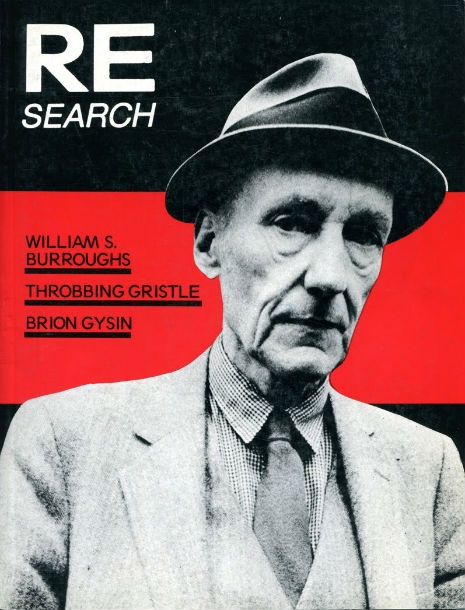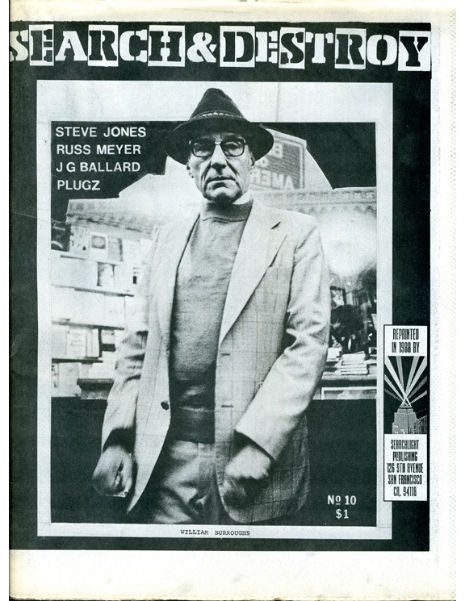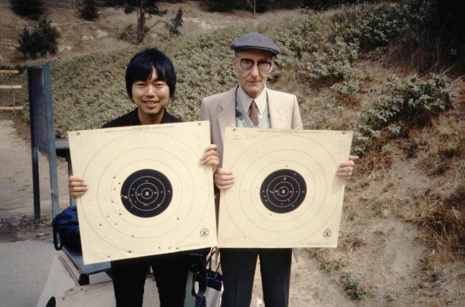
Vale with William Burroughs
This interview with V. Vale was conducted by Michael Lee Nirenberg, director of the 2014 documentary Back Issues: The Hustler Magazine Story
Early in my conversation with publisher and writer V. Vale he called me a “conceptual conversationalist,” although that moniker really belongs to Vale himself. Vale has had an interesting life. He was born in a Japanese-American internment camp in 1944, moved to Haight-Ashbury at the height of the 1960s counterculture movement, joined the original lineup of Blue Cheer, went on to publish punk zine Search and Destroy while working at beatnik bookstore City Lights, and then made his serious mark on the emerging post-punk culture with RE/Search.
For me, the seminal RE/Search journals which Vale has been publishing since the 1980s are a snapshot of culture at its most vital and ideas at their most radical. RE/Search was like early Interview magazine but the interviews were largely unedited, ran long, and each volume more or less tackled a particular subject. Some of the more well-known ones are: Pranks, Incredibly Strange Films, and The Industrial Culture Handbook.
Needless to say Vale’s work has been an influence on me. I met Vale at the New York Art Book Fair last year and interviewed him by phone on April 2, 2017. Below is that conversation edited lightly and segmented because Vale is a stream of consciousness type guy and you have to just roll with him. Enjoy.
______________________________
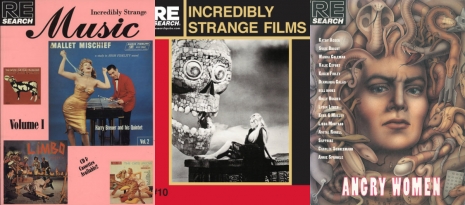
On interviews and conversations
VV: So I invented a phrase for you while I was waiting for you to call; “conceptual conversationalist.” How’s that?
MN: That’s pretty good, man. All of a sudden I feel like I’m in a RE/Search interview.
VV: (laughs) Well that’s proper. It’s all useful. Conversations are two-way streets.
MN: I agree and I think that’s what attracted me to RE/Search throughout the years, and why I return to the volumes. I wrote out a dozen or so question but that doesn’t mean I have a script I’m going to follow. As you know a conversation takes you elsewhere.
VV: The holy grail of a conversation is when suddenly there appears a concept or an idea that neither person has contemplated before.
MN: Yeah. I agree with that and I think that’s when it’s the most successful.
VV: Whatever. I’m not a success or failure guy, I just observe what’s happening but that’s kinda rare and when it happens it’s a mini cause celebre.
MN: I think that’s a good point. I was wondering if everyone who has ever interviewed you has attempted to do a RE/Search interview on some level.
VV: I don’t really call them interviews, I call them conversations. That gives you a lot more latitude to go into some unexpected direction. Play and humor are like the supreme goal I suppose. I don’t know. I suppose I don’t know how to answer that one (laughs), I just try to have fun with whoever I’m talking to.
MN: Yeah, I think I do the same thing.
VV: Good! Hooray we’re on the same wavelength.
MN: Yeah, it seems obvious that humor is the thing that makes life bearable. And ideas.
VV: Well yeah… ideas. Especially ideas. Yeah, humor of course.
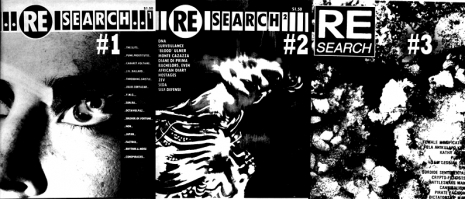
On Capitalism
VV: Oh yeah, ideas especially. The main idea always (laughs) is the overarching theme of how do we make this world a better place? How can we conceptualize a better world? How do we visualize a better world? For example I don’t understand why there aren’t more young artists making films about how life ought to be and dare I say a future that’s post-capitalism. I’m sure you know who (Slavoj) Žižek is and I think the best thing he ever said was, “You can imagine the apocalypse, you can imagine the end of the world, but you can’t imagine a world after capitalism.”
MN: Oh, that’s good.
VV: I’m a capitalist. I make books and hope someone buys them and I obviously need to make a profit so I can pay my rent, but I can’t imagine another system. Boy, if you can you will be the first!
MN: I struggle with this too. For all its flaws, the critiques don’t offer a way out. Look at the countries that went all in with socialism and communism. They started off as such high-minded concepts until they became religion.
VV: Even worse than religion (laughs). I think it’s all patriarchy, but yet I like most ideas of feminism which are actually the same ideas found in anti-racism i.e fighting privilege. There’s that famous saying you probably know which is “privilege confers blinders.” A lot of times if you have privilege you don’t feel it. It doesn’t even exist within the world you’re conceptualizing.
I always said my goal in publishing was (and I stole it from Hegel), “if you’re working, work for more freedom, more consciousness (that’s a great word) and more justice for more people.” The hard thing is the justice because then you get into the grimy world of lawyering and criminality and it’s just so much. Can you imagine if you were a heterosexual seeking a relationship with another heterosexual of the opposite gender. Let’s say complementary gender. I’m not a fan of opposite. I’m a fan of complimentary.
MN: Yes and relativity.
VV: Yes. Can you just imagine a world in which you try to act in perfect justice with another partner? I’m a huge fan of having a partner for a simple reason which is the hardest thing you can do. I’ve never had a job and I managed to support myself mostly and the hardest thing to do is guess what? Make next month’s rent.The other person (your partner) has to worry about the same thing. Take my word for it. It makes life a helluva lot easier and bearable.
More with Vale after the jump…






